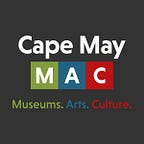Cape May MAC Book Club: Cranford
A recap of our discussion of Elizabeth Gaskell’s 1853 novel
Another two weeks, another lesser-known Victorian-era read crossed off the summer book club list! So far, we’ve read a lesser-known Brontë classic, the memoir of a Crimean war nurse, and a gothic vampire novella that predated Dracula. With our fourth book club pick, Cranford by Elizabeth Gaskell (1853), we ventured into a novel of manners, into the realm of class commentary. There are two more books to go; visit our webpage to learn more. If you missed our live discussion this week, feel free to watch the recording, or read on for a recap!
Elizabeth Gaskell is a generally lesser-known writer from the Victorian era, though she cavorted with the most recognizable names in the business. Close friends with Charlotte Brontë, Gaskell wrote the preeminent biography on the Jane Eyre author. Her own work was often published by Charles Dickens; Cranford, the book of the hour, was serially published in Dickens’s magazine Household Words from 1851 to 1852. It’s no wonder that Dickens thought so highly of Gaskell’s work — the two seemed equally interested in displaying the folly and pain of British class hierarchy within their literature.
Cranford, indeed, is at its core a novel which seeks to force its readers to recognize the ridiculous nature of social divide based on economic class. As a modern reader, this idea is not new or particularly radical. But for an 1850s British writer, herself of the upper-middle class, the notion that a society — like the one in Cranford — could blur the lines between the poor and the wealthy was extremely progressive.
Here’s the first line of Cranford, which we discussed in the livestream: “In the first place, Cranford is in possession of the Amazons; all the holders of houses above a certain rent are women.”
The fictional town of Cranford — based on Gaskell’s true hometown of Knutsfield — is one where men seem to disappear, enlist in the war, or die, leaving the town in the hands of widows and spinsters. The book is comedic, truly funny in every chapter. And through that humor, the ridiculousness of British propriety — from proper party decorum to the right utensil for spring peas — is brought in full, humors effect. In that way, Gaskell presents somewhat of an all-female utopia, a town where the women are unhindered or restrained by their male counterparts and are thus able to find a new way to relate to each other outside of class.
Though, we did agree, this book was the slowest of the bunch we have read so far. Despite its very funny nature, the novel is often repetitive, and gets lost a little bit in its own silliness. It is, however, one worth reading for those interested in tracing the history of literature concerned with class consciousness, or with early feminist presentations.
Up next for the Cape May MAC Book Club is Three Men in a Boat by Jerome K. Jerome. George, Harris, Jerome, and of course, their dog Montmorency, set off on a boating holiday up the River Thames. What begins as a serious travelogue devolves into a raucous adventure, rife with cultural commentary and humor that feels shockingly modern. Upon release, this comedic book was dismissed as vulgar and immature — only to be rediscovered and cherished by later generations more open to, shall we say, a raunchier sense of humor. Join us at 11am on Saturday, August 13th for the live discussion!
Evelyn Maguire (she/her) is on the Digital Marketing team at Cape May MAC. She is an MFA candidate at the University of Massachusetts Amherst.
